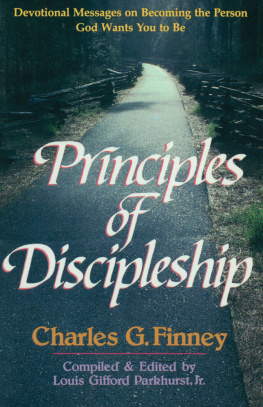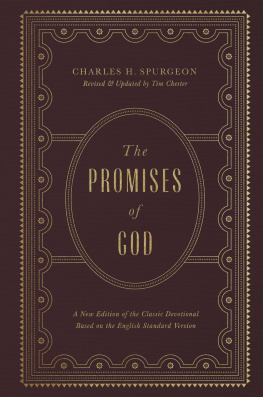Charles G. Finney - The Promises of God
Here you can read online Charles G. Finney - The Promises of God full text of the book (entire story) in english for free. Download pdf and epub, get meaning, cover and reviews about this ebook. genre: Romance novel. Description of the work, (preface) as well as reviews are available. Best literature library LitArk.com created for fans of good reading and offers a wide selection of genres:
Romance novel
Science fiction
Adventure
Detective
Science
History
Home and family
Prose
Art
Politics
Computer
Non-fiction
Religion
Business
Children
Humor
Choose a favorite category and find really read worthwhile books. Enjoy immersion in the world of imagination, feel the emotions of the characters or learn something new for yourself, make an fascinating discovery.
- Book:The Promises of God
- Author:
- Genre:
- Rating:3 / 5
- Favourites:Add to favourites
- Your mark:
- 60
- 1
- 2
- 3
- 4
- 5
The Promises of God: summary, description and annotation
We offer to read an annotation, description, summary or preface (depends on what the author of the book "The Promises of God" wrote himself). If you haven't found the necessary information about the book — write in the comments, we will try to find it.
The Promises of God — read online for free the complete book (whole text) full work
Below is the text of the book, divided by pages. System saving the place of the last page read, allows you to conveniently read the book "The Promises of God" online for free, without having to search again every time where you left off. Put a bookmark, and you can go to the page where you finished reading at any time.
Font size:
Interval:
Bookmark:
THE PROMISES OF GOD
By
Charles Finney
Text.--2 Pet. 1:4: "Whereby are given unto us exceeding great and precious promises, that by these ye might be partakers of the divine nature, having escaped the corruption that is in the world through lust."
I. I am to make several preliminary remarks upon the nature of the promises.
1. The promises made to the church under the old dispensation belong emphatically to the Christian Church. Thus the promise made to Abraham was designed more for his posterity, and for the Christian Church than for himself. That part of the promise which related to the temporal possession of Canaan never was fulfilled to him. He lived and died "a stranger and sojourner in the land of promise." In Heb. 11:13 we are expressly informed that Abraham did not receive the fulfillment of the promises, but that they belonged especially to Christians under the New Testament dispensation. "These all died in faith not having received the promises--but having seen them afar off, and were persuaded of them, and embraced them, and confessed that they were strangers and pilgrims on the earth," i.e. Abraham and the patriarchs died without receiving the fulfillment of the promises. Again, verses 39-40, -"And these all, having obtained a good report, through faith, received not the promises; God having provided some better thing for us, that they without us should not be made perfect." So the New Covenant in Jer. 31:31-34: Behold the days come, saith the Lord, that I will make a new covenant with the house of Israel, and with the house of Judah; Not according to the covenant that I made with their fathers, in the day that I took them by the hand, to bring them out of the land of Egypt; (which my covenant they brake, although I was an husband unto them, saith the Lord;) but this shall be the covenant that I will make with the house of Israel after those days, saith the Lord, I will put my law in their inward parts, and write it in their hearts, and will be their God, and they shall be my people. And they shall teach no more, every man his neighbour, and every man his brother, saying, Know the Lord; for they shall all know me, from the least of them to the greatest of them, saith the Lord, for I will forgive their iniquity, and I will remember their sin no more. Also, Jer. 32:39-40: -"And I will give them one heart and one way, that they may fear me forever for the good of them, and of their children after them; and I will make an everlasting covenant with them, that I will not turn away from them to do them good; but I will put my fear in their hearts, that they shall not depart from me." Also, Ezek. 36:25-27: --"Then will I sprinkle clean water upon you, and ye shall be clean; from all your filthiness, and from all your idols will I cleanse you. A new heart also will I give you, and a new spirit will I put within you; and I will take away the stony heart out of your flesh, and I will give you an heart of flesh. And I will put my Spirit within you, and cause you to walk in my statutes, and ye shall keep my judgments, and do them."
And numerous other kindred promises, made to the church under the Old Testament Dispensation, belong particularly to the Church under the Christian Dispensation. Consequently the Apostle in Heb. 8:8-12 maintains that the covenant in Jer. 31:31-32 respects particularly the Gospel Dispensation. -"Behold the days come, saith the Lord, when I will make a new covenant with the house of Israel, and with the house of Judah: Not according to the covenant that I made with their fathers in the day when I took them by the hand to lead them out of the land of Egypt; because they continued not in my covenant, and I regarded them not, saith the Lord. For this is the covenant that I will make with the house of Israel after those days, saith the Lord, I will put my laws into their mind, and write them in their hearts, and I will be to them a God, and they shall be to me a people: And they shall not teach every man his neighbor, and every man his brother, saying, know the Lord: for all shall know me, from the least to the greatest. For I will be merciful to their unrighteousness, and their sins and their iniquities will I remember no more."
2. The promises made to the Church as a body, belong to individuals of the Church. The Church is composed of individuals, and the promises are of no avail, any further than there is an individual application of them. 3. Promises made to the Patriarchs, and Individuals, under the Old Testament Dispensation, as well as under the new, belong to all individuals, in every age and land, under similar circumstances. Thus we find the inspired writers recognizing the principle, every where, in their writings, in the use they make of the promises. As an illustration, see Heb. 13:5 --"I will never leave thee, nor forsake thee." If you turn to Gen. 28:15, you will see that the promise which the Apostle applies to all Christians, was originally made to Jacob, on his way to Padanaram. "And behold I am with thee, and will keep thee, in all places, whither thou goest, and I will bring thee again into this land; for I will not leave thee, till I have done that which I have spoken to thee of." So in Heb. 13:6 --the Apostle continues, "The Lord is my helper, and I will not fear what man shall do unto me." This also is quoted from Ps. 56:4, 11, --"In God I have put my trust; I will not fear what man can do unto me."
Let these serve as specimens of the manner in which inspired writers make an application of the promises. In the experience of every Christian, it is manifest that the Spirit of God makes the same application of the promises to their minds. And thus the promises are a kind of common property to the saints. Who has not been edified, and refreshed in reading the biographies of highly spiritual men; by observing the copious use of the promises which the Spirit of God makes in refreshing the souls of the saints. 4. The promises made to Israel and Judah, in the Old Testament, are promises made to the whole Christian Church, both Jews and Gentiles. Thus the Church of Christ is called the "Israel of God." And the Apostle expressly affirms that "they are not all Israel which are of Israel." But this fact is abundantly confirmed, that the true Israel of the Scriptures, is the true Church of God, in every age--to whom, collectively and individually, all the promises of the Bible belong.
5. The promises mean all they say; in other words, they are to be interpreted by the same rules by which we interpret the commandments. e.g. the promise in Deut. 30:6, --"And the Lord thy God will circumcise thine heart, and the heart of thy seed, to love the Lord thy God with all thine heart, and with all thy soul, that thou mayest live," is to be interpreted by the same rule by which we interpret the commandment, "Thou shalt love the Lord thy God with all thy heart, and with all thy soul." So the promises in Ezek. 36:25-26 --"Then will I sprinkle clean water upon you, and ye shall be clean: from all your filthiness, and from all your idols, will I cleanse you. A new heart also will I give you, and a new spirit will I put within you; and I will take away the stony heart out of your flesh, and I will give you a heart of flesh," is to be understood as implying just as much as the commands in Ezek. 18:30-31 --"Repent, and turn yourselves from all your transgressions, so iniquity shall not be your ruin. Cast away from you all your transgressions, and make you a new heart, and a new spirit." So also the promise, "I will put my Spirit within you, and cause you to walk in my statutes, and ye shall keep my judgments, and do them," is to be construed as meaning just as much as the commands, "walk in my statutes," and "keep my commandments" mean.
6. We never keep the commandments, only as we take hold of the promises. By this I mean, that grace alone enables us, from the heart, to obey the commandments of God. It is, therefore, only when we lay hold of the promise, by faith, and receive its fulfillment in ourselves, that we really, in heart, obey the commandments of God; e.g. we never love the Lord our God, according to the first great commandment, only as we lay hold on, and receive the fulfillment of some such promise as this: "I will circumcise thine heart, and the heart of thy seed, to love the Lord thy God with all thy heart, and with all thy soul, that thou mayest live."
Next pageFont size:
Interval:
Bookmark:
Similar books «The Promises of God»
Look at similar books to The Promises of God. We have selected literature similar in name and meaning in the hope of providing readers with more options to find new, interesting, not yet read works.
Discussion, reviews of the book The Promises of God and just readers' own opinions. Leave your comments, write what you think about the work, its meaning or the main characters. Specify what exactly you liked and what you didn't like, and why you think so.












